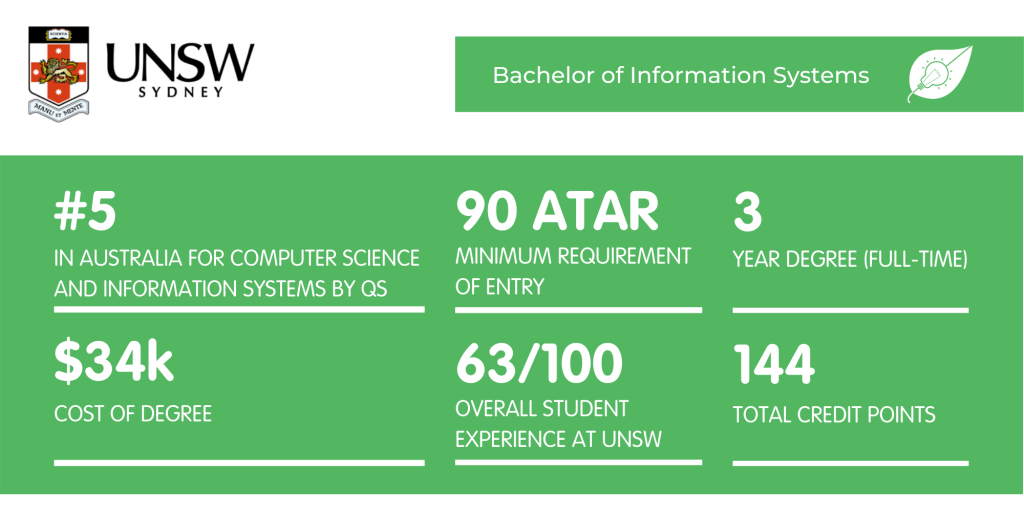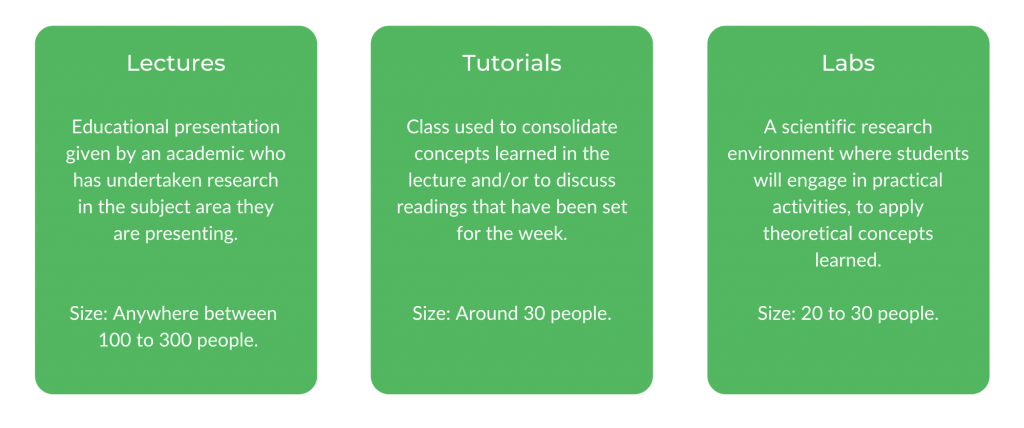Thinking about studying a Bachelor of Information Systems at UNSW?
This article will give you the lowdown on what this degree is like! From future career paths to faculty culture, here’s everything you need to know about studying Information Systems at UNSW.
Let’s dive in!
What is a Bachelor of Information Systems at UNSW?
Core Units for this Degree
How to Get into a Bachelor of Information Systems at UNSW
What’s the Teaching Format?
What’s the Faculty and Culture Like?
What is a Bachelor of Information Systems at UNSW?
A Bachelor of Information Systems at UNSW combines the study of information technology with core business concepts to prepare you to thrive in a tech-driven world! Information Systems is a specialised degree that explores how technology is used in the business industry.
The core units that students engage in examine information technology (IT) and business concepts from programming and app development to accounting and economics. This degree can be taken along with a Bachelor of Commerce as a 4-year double degree program to give you an extra leg up in the business industry!
Career Paths
In an increasingly tech-driven world, Information Systems graduates are in high demand, with career prospects ranging from IT development to consulting.
Here’s an idea of what kind of career a degree in Information Systems can give you:
-
- Information System Consultant
- Information System Architect
- Management Consultant
- Network Developer
- Technical Manager
Core Units for this Degree
All students studying a Bachelor of Information Systems will have to complete 12 core units along with prescribed electives in the course of the degree.
-
- Digital Transformation in Business
- Introduction to Business Databases
- Fundamentals of Business Programming
- Business Analysis
- Intermediate Business Programming
- Database Management & Big Data Infrastructures
- Enterprise Systems
- Introduction to Business Analytics
- Business Process Management
- Information Systems Innovation & Transformation
- Networking & Cyber Security
- Mobile Applications Development
Here’s a little peek at a few of the core units:
| Core Unit | Description |
|---|---|
| Digital Transformation in Business (INFS1602) | Introduces students to how information systems are used in the industry, examining the issues and management of information systems in relation to businesses and their products and services. |
| Introduction to Business Databases (INFS1603) | Introduces students to the core concepts and technologies needed to create and manage business databases and information. |
| Business Analysis (INFS2603) | Furthers students’ knowledge of information systems by building their business analysis skills. |
| Business Process Management (INFS3604) | Teaches students about the way that business processes can be analysed, redesigned and improved to meet the needs of their customers in the form of software. |
Have a look here for descriptions on all the core units!
Are there built-in internship programs?
Although this degree does not have any built-in internship programs, there is a third year course (INFS3020) that gives students the opportunity to go on a two-week study tour to one Asian country!
The study tour involves visiting large international companies to provide students with a firsthand observation of businesses and develop their understanding of the international aspect of information systems business operations.
How to Get into a Bachelor of Information Systems at UNSW
An ATAR of 90 will guarantee you entry into this course! If you don’t quite achieve this ATAR, however, Adjustment Factors (also known as Bonus Points) can boost your selection rank based on what band you achieve in certain subjects, such as English and Maths.
UNSW also provides alternate pathways into their degrees, such as the ACCESS Scheme. Check out how it works and if you’re eligible to apply here!
Are there any prerequisites or assumed knowledge?
A Bachelor of Information Systems does not require any prerequisite HSC subjects. However, Mathematics is considered ‘assumed knowledge’ by the university, so it’s recommended to take at least Advanced Mathematics in the HSC.
Scholarships
A Bachelor of Information Systems (Co-op) is a scholarship program that provides financial assistance, secured internships, industry mentoring and placements integrated into the degree. This Co-op degree in Information Systems is a different degree from a Bachelor of Information Systems, with different entry requirements and a separate application process.
UNSW also offers a whole host of scholarships that you can apply for! Check out the full list here.
What’s the Teaching Format?
Are there semesters or trimesters?
UNSW teaches under a trimester format. This means that there are three 10-week terms across the year and increased flexibility! A normal workload is eight courses in a year (split 3, 3, 2 for example) but with trimesters, overloading with nine courses in a year is possible.
Overloading and studying 3 courses per term (resulting in nine units per year, as opposed to the usual eight) means that you can potentially fast-track your degree and finish before the full three years!
Class Structure
Information Systems at UNSW is taught through lectures, tutorials and labs.
Lectures
Lectures are where you learn the content of the course and can have anywhere from 100 to 300 students! They often go for 2 hours and are rarely compulsory, so you have the freedom to either learn independently from lecture recordings and slides, or join your peers in a lecture hall!
Tutorials
Tutorials are where you consolidate the content learnt from lectures through solving problems and discussing course content with 30 or so other peers. Tutorials are a place where you can ask any questions you may have from watching the lectures, make friends and apply your knowledge to real-life case studies and problems.
Labs
Labs are where you learn to code and use a range of softwares in a computer lab with 20 to 30 other people. Labs can go from 1 to 3 hours and are a place where you can get hands-on experience with the concepts learned in class!
How often will you have to be on campus?
Students studying Information Systems at UNSW will roughly have 12 or more contact hours in a week, meaning that you’ll likely see yourself on campus for 2-3 days a week.
What are the assessments like?
Most Information Systems courses will have a group assignment component that will be worth the most other than the final exam. These assignments vary from course to course, but will often involve some sort of presentation.
Most courses will also have a final exam where you’ll be assessed on the course content through a range of formats like multiple choice, short answer or extended response.
Ongoing assessments throughout the term are also a feature in this degree and can come in either online quizzes, tutorial participation or weekly homework. Be sure to consult your course outline for a clear idea of what is due each week!
Skills That You Develop
A Bachelor of Information Systems at UNSW will equip you with a wide range of skills essential for working in a tech-related business industry!
You will develop problem solving and critical thinking skills through the case studies presented in class, and refine your analytical skills as you assess the information and data given.
The group assignments and projects will teach you how to collaborate effectively with others who have a range of backgrounds, strengths and weaknesses. Learning to work with your team will also develop your communication and leadership skills.
What’s the Faculty and Culture like?
Information Systems is part of the School of Business, which sports a large faculty and cohort, with thousands of new students joining per year!
Don’t fret though, as Information Systems is a smaller, more specialised degree, this means that you will be able to see people you recognise as you progress. Most of your peers will be looking out and pushing each other forward as many students are highly academically motivated!
Societies
UNSW is known for their large range of clubs and societies, which are a great way for you to form genuine connections with other students outside of your degree!
BIT ISM Student Association (BITSA) is the society associated with Information Systems and is known for supporting students by hosting networking events, professional upskilling workshops and lots of social events like trivia nights! You’ll also have the chance to interact with lots of upper year students who will have lots of helpful advice and study resources!
Other societies, such as Women in Technology (WIT) also feature events like hackathons and skill-building workshops and are a great place to develop experiences that will continue to assist you in the workforce.
Check out more about these societies here!
Support Programs
UNSW’s Business School runs a program called Peer Assisted Study Sessions (PASS), which is a useful resource in helping you ‘pass’ your course!
Older, high achieving students lead the weekly PASS, explaining course content and providing free tutoring to support you in your studies. There’s no need to register or apply, this program is made available to everyone studying a business related degree!
We hope this article helps you as you make lots of big decisions after high school!
Millicent Tai hopes to one day become a full-time teacher and is currently studying a Bachelor of Education and Bachelor of Science at UNSW. She enjoys tutoring students at Art of Smart in English and Maths and has loved reading and writing for as long as she can remember. In her spare time, you can find her avidly reading Christian biographies or fishing in Animal Crossing.






